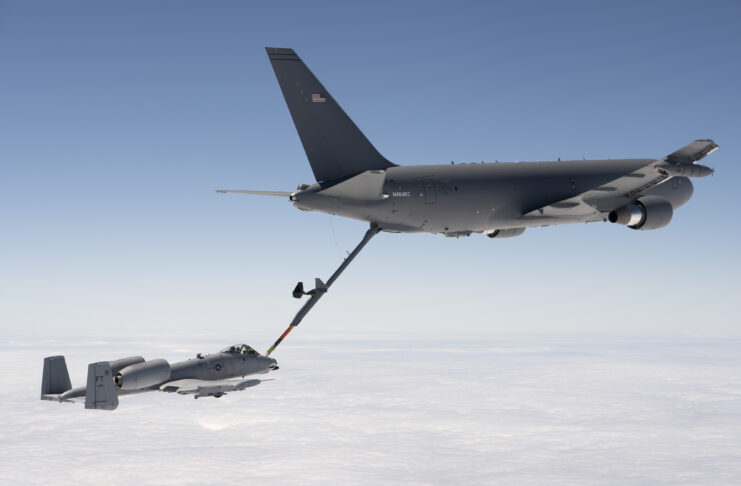Have you ever had to do a complicated job without the right tools?
For more than a decade, having the right equipment was a life-or-death matter for me and some of my closest friends. I was an Army Ranger whose job included, but wasn't limited to, dropping into Afghan combat zones at night, securing them and leading raids against insurgent forces. Our task force had to be in and out in a matter of hours, often bringing high-value captives back with us.
What I learned is that the best equipment – from radios and night-vision goggles to weapons, optics and aircraft – often comes down to two key qualities. It must be well-designed for its intended purpose but also be adaptable to evolving circumstances. And leadership must be able to decide what equipment fits these characteristics before every mission.
Today, our political and military leaders face a decision like this. They are being lobbied by Boeing and Airbus to choose which of these behemoth defense contractors should receive a billion-dollar contract to build the next generation of aircraft refueling tankers. Based upon the available evidence, the Boeing KC-46 Pegasus comes out ahead because it can better accomplish our military's dynamic missions.
For starters, the Airbus A330 MRTT is significantly heavier than the Pegasus and takes up close to one-and-a-half times as much space on the ground. This may not make much of a difference when flying routine missions from large, well-equipped airbases stateside or in Europe. But attempting to operate the MRTT from more remote and limited airstrips, especially in the Pacific, could turn into a severe logistical challenge – especially since it also has a wider turning radius than the Boeing tanker, requiring more space to get around on often-tight runways. This is a case when bigger isn't better: the Airbus will only be more likely to get in the way of the fighters and bombers it's supposed to be supporting.
In addition to making flight crews' jobs more complicated, the MRTT's airframe creates significantly more drag than that of the Pegasus, which means that it burns much more fuel. The tanker is supposed to supply other aircraft so that they can complete their missions, but it will instead impose an extra logistical burden just so it can get to those aircraft in the first place. It's the opposite of the versatile, effective equipment our troops need and deserve.
Even if all of these disadvantages could somehow be mitigated, the problems with getting MRTTs built and delivered start right on the production line. The Boeing tanker is purpose-built from the beginning as a military refueling aircraft: all the protective and mission-specific features are included when it's assembled. The Airbus, by contrast, starts out as a regular A330 commercial airliner and is then fitted with all of the complex systems a tanker needs. That means ferrying European-built airframes across the ocean, then partially rebuilding them here, rather than simply using American-built aircraft. Add to this all the additional certification that the MRTT would have to go through to meet the Air Force's unique requirements, and it becomes clear that it's not the responsible choice.
Finally, a contract for the KC-46 has less risk for taxpayers. The prior generation of Boeing refuelers went way over-budget – but Boeing bore those costs instead of passing them onto the taxpayer. Cost overruns are a common problem among defense contractors, so Boeing's willingness to continue footing the bill on a fixed-cost contract means that the company will continue to be responsible for delays or cost overruns. As a country, we have a pattern of overspending, which builds more debt, which weakens our nation. Keeping the Boeing KC-46 as our tanker of choice is a small step in more responsible spending.
The facts are clearly in favor of the KC-46 over the MRTT, but politics don't always square with the facts. Special interests are pushing for the inferior craft, and some politicians are standing with them.
The best leaders and organizations operate from a place of integrity, and they evolve and adapt as circumstances require. With the Air Force struggling to salvage the expensive F-35 program, we can't afford another major aircraft program misfire – and our military can't afford for leaders' courage to fail over politics. Following through with the Boeing KC-46 Pegasus might not be the popular choice in some circles, but it is the responsible choice for our troops and for the American taxpayer.
The opinions expressed in this article are those of the author and do not necessarily reflect the positions of American Liberty News.
READ NEXT: Paul Ryan Refuses to Attend RNC if Trump Wins 2024 Nomination



Absolutely, the Boeing is the best choice. In the first place, It is not understandable why we continue to consider foreign sources for our military. If politics is the answer (and we know what kind of politics that is), then we are going down the wrong rabbit hole. Keep these things in America where the manufacturers can best protect and be protected.
Need surplus 747s as tankers to & cargo
As anything the government does, the taxpayers are the very last people decisions are made on! And politicians hold the purse strings and their first priority is what kind of kickbacks they are going to receive! It is truly sad and totally third world, but that is where the nation is nowadays!
The writer leaves out a detail too many pencil-pushers in DC think is #1. What do they cost?
B.S. The MRTT is bigger because it carries more fuel KC-46 – 212,299 lb (96,297 kg) of fuel VS. MRTT – 245,000 lb (111,000 kg). It is proven and has been delivered for years. There are more MRTT in service then KC-46. The KC-46 still has flaws that are being worked out. And will The KC-46 be combat ready in 2023. Has Boeing fixed the fuel tank leaks? Boeing needs this plane but it is losing money on the program.